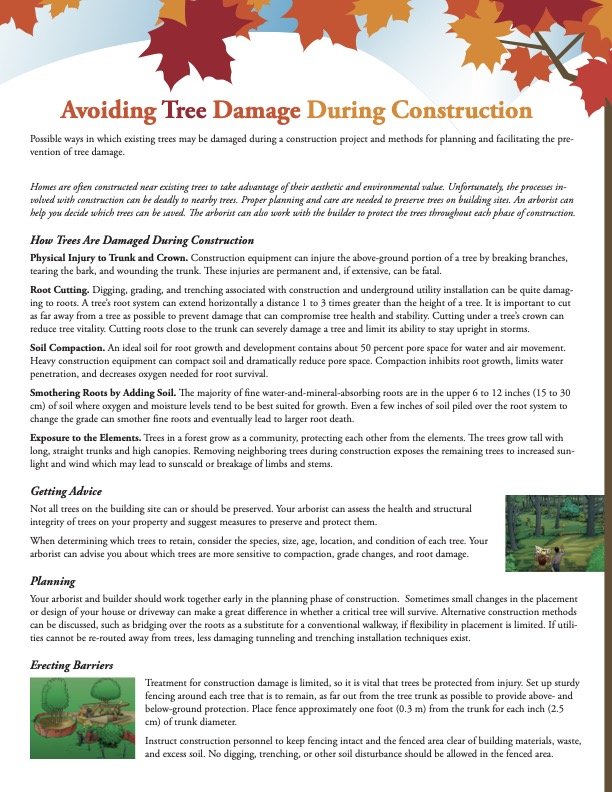Are you doing landscaping or renovations to the outside of your home? If there is any kind of heavy machinery planned, it pays to think ahead about which trees will be affected. Soil compaction, root damage, bark damage, and backfilling can all have major consequences to the trees within a range. And of course sometimes collateral damage is necessary, but the effect is irreversible, so it’s wise to make informed choices and avoid a surprise like a large dying tree next to your new build.
Mulching your trees
Mulching is the number one thing to give your tree the boost it needs in difficult conditions, and otherwise is just a great idea for regular tree-care.
Mulch benefits:
maintains soil moisture by reducing evaporation — and the need for watering
acts like an insulating blanket, keeping soil warmer in winter and cooler in summer
improves soil aeration, structure, and drainage
inhibits certain plant diseases
protects the tree from humans — our feet compacting the soil, and our tools like lawnmowers and grass trimmers
However, too much mulch will stop gases exchange with soil; it can soak up too much moisture, not allowing water to percolate down to the roots; and if it is very near to the root collar of the tree, you can actually initiate crown rot.
So, mulch 2-4" deep, and keep a good 2" away from the stem of the tree.
Keep in mind that the root system of the tree is wider than most people imagine: the roots are typically 1-3 times the size of the canopy of the tree. Ideally, you want to fan the mulch out as far as possible to gain the most benefits (though that much mulch spread around the tree will look a little ridiculous, so find a happy medium).
Types of organic mulch include leaf litter, bark, wood chips, evergreen needles, and compost mixes.
You can also buy inorganic material (stone, rubber, geotextiles). Since they don’t decompose, you don’t need to maintain them. But at the same time, they don’t offer any nutrients or organic components, so the payoff is not nearly as great as organic mulch.
Using canola oil in chainsaws
I’ve had quite a lot of people ask me what I mean by eco-friendly tree care, including “no chain oil”. Chainsaws require a lubricating agent in order to run the chain and bar, and generic chain oil is petroleum based. This means that when a chainsaw is running, virtually all of the oil in the reservoir ends up on the ground. And the oil mist ends up in the user’s lungs.
You can switch from petroleum-based products to common vegetable oil (which is cheaper, too). The downfall is that if you leave vegetable oil out in extreme cold, it will freeze. I solve this problem by keeping my big container of oil inside in the winter, and a smaller bottle to take along to jobs, which gets used up quickly. (Stihl also makes a biodegradable chain oil, but it’s not always available in remote locations--ask your local retailer.)
Europe (and California) is leagues ahead of us in using vegetable-based oils as a common, regulated practice. In Austria, for example, petroleum-based chainsaw oils are totally banned.
Here’s a very useful article which lays out tips for making the switch, but really, it’s easy!
http://eartheasy.com/blog/2010/11/using-vegetable-oil-to-replace-chainsaw-oil/
Dealing with winter-storm damage to trees
This winter hasn’t been particularly nasty, but we’ve had some small ice storms and heavy snow dumps that caused damage to trees. If you have a tree that’s been damaged and is close to buildings, property, or pedestrian traffic, then it's worthwhile to do a tree-risk assessment.
Read MorePlanting trees - When to plant
Following the tree giveaway for Earth Day in Wakefield, I wanted to post a longer version of the instructions for planting your new tree, supported by the International Society of Arboriculture.
Read MorePhytoremediation
Phytoremediation. I know, it’s a mouthful. In a butternut shell, it is the use of plants to clean up contaminated environments. Plants from all around the kingdom—mushrooms, grasses, shrubs and trees—can pick up a mop and play air guitar to the tune of “heavy-metal” clean up.
Trees are spectacular at contaminant degredation because they are big, woody plants that grow quickly. And what’s even more interesting is that some trees pegged as “pesky” in some situations actually turn out to be the best at absorbing harmful materials. Trees can clean up in several ways: by uptaking, storing, and degrading contaminants within their tissues, or else by transforming and releasing them into the air; or else through symbiotic associations with soil microbes to degrade the contaminants underground.
Poplar trees have somewhat of a bad rap because they are pioneer species that grow quickly and are often short lived. But because of their well-designed root system, they have amazing absorption power that has been widely studied for effectively cleaning up chlorinated solvents and petroleum hydrocarbons, and in contaminated water, they have done well to absorb lead. (Red maples, another quick growing tree, also work well in tandem with hybrid poplars for uptaking leachates.)
Willow trees like wet feet, the saying goes, so you’ll often find them along shorelines or in wet areas. They, too, have powerful root systems that can sometimes be bothersome when growing near septic systems or other underground infrastructure. But the incredible absorption of their roots can uptake heavy metals like cadmium, nickel and lead, and even mixed heavy metals like diesel-fuel.
My article in Ottawa Magazine
When I did this interview Stephen Dale, he was fascinated that we didn't use spurs to climb healthy trees, and the reasons for this. I hope that coverage of arboriculture in media raises an interest in recreational climbing, as well as an appreciation for the proper care of trees.
Rescue Article in Arborist News
This is the international magazine for arborists; we published the article just in time for the world's event in Toronto, 2013.




